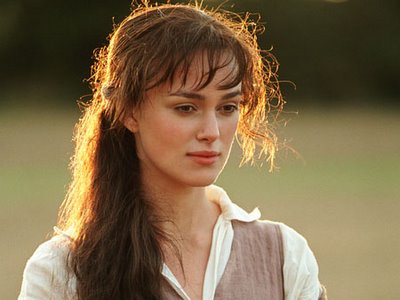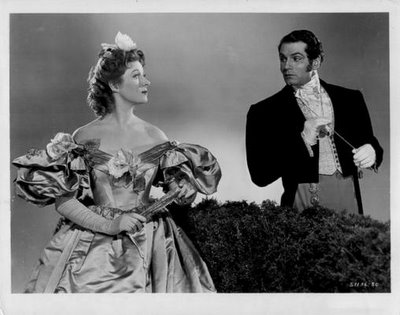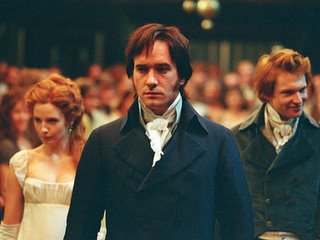How much does historical accuracy matter to you?
I ranted a bit on the subject yesterday…but now I’m calmer, and I’d like to know what everyone else thinks.

At the Austen movie exhibition at the Museum of Costume in Bath, they argued about the EMMA costume shown here, “Gwyneth Paltrow’s green and white dress, with its large, chocolate bow on the bodice, has none of the subtlety of the fabrics that other designers have used… In a way, the pattern looks more like a textile design from the 1970’s… This is just what Hollywood requires: simple dresses, simple messages.” So: does this dress bother you? Is it too anachronistic, or do you like the way it captures Emma’s “princess” role in her community? How accurate do you think fabric and cut need to be? Is having an accurate outline enough?

Or how about hair, and bonnets? Does it bother you that Emma goes outside throughout the movie with the hairstyle shown above, and no hat or bonnet? Or how about Keira Knightley’s Elizabeth Bennet, who skips a bonnet, and also has her hair down? Is that too ahistorical for you?

How about Greer Garson, in the 1940 PRIDE AND PREJUDICE movie? It is commonly said that in this film, they gave the men Regency styles, and the women the styles of a decade or two later….but doesn’t this dress also look very 20th century? Does it bother you that the women aren’t wearing dresses that are remotely Regency? And does Garson’s non-period hair bother you?


Here we have two shots of Embeth Davidtz playing Mary Crawford in the recent movie of MANSFIELD PARK. This, in my opinion, is the most anachronistic dress of all, but it does convey Mary Crawford’s slinkiness, and sophistication. Does this dress drive you bats? (I wish I could also find a photo of Miss Bingley’s sleeveless dress — I don’t believe one exists on the internet! But here’s her other dress, which is less wrong, but still odd.)

How about accuracy in books? When Heyer talks about the Little Season during the Regency, though it didn’t yet exist, does that annoy you? When another author’s hero runs away at eighteen and purchases a commission in the navy, do you shout at the book? When Sir William is also Sir Barton, and Lord Brighton is also Lord George, do you throw the book against the wall? Or are all of these annoyances minor to you (if indeed you notice them at all)?
What kind of inaccuracies bother you most? Easily checked facts, such as title, distances between towns, how fast a carriage could go? Or the mindset of the times? Or the rules of society?
Please share!
Cara
Cara King, www.caraking.com
MY LADY GAMESTER — Signet Regency, out now!!!

As long as the film is true to the essence of the story, historical accuracy bothers me NOT A WHIT. For example, one of my favorite literary conceits is the playing of Shakespeare in different time periods–Ian McKellen in Richard III during WWII, for example.
If I were a fashion or history geek (geek, yes, I am, but not specifically those categories), I can see being bothered, but honestly, as long as the story is compelling, I don’t care.
And, in fact, even though I am usually pretty mild-mannered about things, I do get in a rage when people allow what i perceive as petty concerns to alter their perceptions of the greater picture.
Megan, raging.
Speaking of Shakespeare, Megan, there are TONS of anachronisms (and geography errors) in Shakespeare — and yet, I somehow seem to enjoy his works.
I once knew a very intelligent, well-educated German lady who saw a production of Hamlet starring Ralph Fiennes (quite a nice production, too). She hadn’t been at all familiar with the story, and after she saw this production, she didn’t think much of Shakespeare’s play. She complained that in that period, Ophelia would never have been allowed to run about like that unattended…
Which was perfectly true, but if that’s all one gets out of one of the greatest works of literature ever, I think one is missing out on a great deal!!!! (That was understatement, BTW, notwithstanding the exclamation points.)
Now, I’m not going to claim that the film versions of “Emma” or the new “Pride and Prejudice” are the cinematic equivalent of “Hamlet” — but my feeling is the same. The way I see it, the person who cannot stand “Emma” because the fabrics weren’t period, or who detests the new P&P because not all the costumes are from the same year, or says “Star Wars” is a worthless movie because ships don’t really whoosh in space, is living a sad, sad life, and missing out on so much…. 😉
Cara (full of compassion for foolish mortals)
Accuracy, in my oh-so-humble opinion, can be carried too far. In my time, John Phillip Kemble, though talented in many areas, made himself a laughingstock by pronouncing the word “ache” as “aitch” onstage because he insisted it was more authentic to Shakespeare.
Had he been playing it to the Bard’s grave, I could understand it. But he was playing to us. Oh, how our sides ached with laughing!
Bertram St James, Exquisite
I do sometimes notice inaccurate details. (And yes, Cara, I know exactly what book you were referring to when you talked about 18-year-olds running away and buying a commission in the Navy.) But I would say that it has to get pretty extreme before it stops me from enjoying a movie, or a book. I mean, heck! I enjoyed the movie THE CORE, for crying out loud! (Though I must say ARMAGEDDON was too much for me, though that was partly because it was just a lousy movie.)
I am bothered more when film makers (or writers) get stuff wrong for no very good reason, that would be very easy to get right. The recent ZORRO movie, for example, refers to the Confederate States in 1850!!! Hello, was every single person connected to this movie asleep during history class?! (I exempt Antonio Banderas and Catherine Zeta-Jones, who are foreigners and presumably don’t know any better. Though now that I think about it, they’re both married to Americans!) And why? Why not just call it “The South”? Would that be so hard?!
And yet, in spite of this (and oh, so much more), I still mostly enjoyed the movie. Go figure.
I seem to have strayed from the original subject: but in a nutshell, lack of historical accuracy doesn’t bother me (much) unless it seems particularly egregious and unnecessary. Or unless the film is lousy.
Todd-who-could-be-compassed-in-a-nutshell
I’m not a purist either. The other thing is I don’t want to throw stones as I live in a glass house myself. Who knows what historical errors I may have committed?
It can be the things you think you know that bite you and no writer/mother has the time to check everything. And sometimes the truth is so odd that it might not be accepted or understood, or there’s a commonly held misconception you’re fighting against. (Though in those cases an author’s note can be useful.)
I do notice errors, but usually they don’t bother me too much. Laura Kinsale gets titles wrong sometimes, but she gets so much else right that she’s still one of my favorite authors.
I think it does annoy me when I sense that the creator of the book/film/whatever didn’t make any attempt at understanding the time period in question. The most blatant error I’ve seen was in a Regency set historical in which the author assumed the British were fighting the Portuguese on the Peninsula rather than the French.
Elena
Oh and yes, I still think Megan might have worn that slinky black dress in the Regency (and looked stunning in it).
Elena 🙂
Thanks, Elena, for the compliment–I think that dress is gorgeous, and I would wear it in a heartbeat. Preferably his.
There’s a difference between getting it all right and just getting it wrong. Like, we all know Carla Kelly (and now Laura Kinsale) get titles wrong, and we all have our historical accuracy hobbyhorses. But I don’t like it when, as Todd and Elena mention, it seems like the person has no FEEL for the period, and gets basic things wrong that are obvious to anyone who has an interest in the time period. Sure, we might all screw up the dancecard thing, or the Little Season, or whatever, but we know who was fighting whom and why it was important. We’re not just writing a story and dropping it, fully=born, into a historical setting.
Myretta Robens did a workshop on Historical Accuracy at the New Jersey conference that was excellent, and she mentions Jo Beverley as an example of intricately layering history throughout the story, making one impossible without the other. Who else does this well, would you say?
Weighing in, here (and I’m not confessing how much I’m weighing in!), I very much care for accuracy. Does that mean a book or a movie are ruined for me if I notice something I believe is wrong? No. The movie/book would have to be pretty bad before it would.
When I write, I live in fear of making an error. I also realize that my knowledge has its limits and that I likely have some beliefs of the period that are not accurate. (Someday I’ll find them out and be embarrassed). But I also tell myself that no one knows everything about a past time, absolutely. There’s no way we can. As time has gone on, I’ve realized I’ve actually become more tolerant of “errors” because I’ve come to understand that more and more.
Okay…on what bothers me the most…attitude and speech anachronisms, particularly heros and heroines who seem like modern youth in period dress. There’s a difference between developing a period character with unique traits and making a character who is not period at all.
Movies…the Greer Garson version of P&P made me crazy the first time I saw it. Eventually I decided that the movie was a period piece in itself, when ladies had to be glamorous no matter what, and if that meant wearing Victorian costumes and makeup, and casting a heroine who looked too old for the role (imo), it was understandable. Although, I never liked Greer Garson in the role (too self-aware, perhaps?) and I never liked the changes in the story, especially the one making Lady Catherine a secret partner to Darcy’s wish to marry Elizabeth.
OTOH, I loved how Lady Catherine was played in that movie! The scene of her sitting on the music box, and proceeding to comport herself with complete dignity, was priceless.
The ribbon on Emma’s dress didn’t bother me. I never even noticed it. And I wouldn’t pay much attention to when the “little season” was introduced, since it doesn’t seem of much consequence. But the laws governing marriage and inheritance at the time are very important to me, for instance, as well as what else was happening at the time in the world, politically and otherwise–if alluded to in the story. Errors such as those take me out of the story, for I immediately feel I am not in the Regency after all.
Laurie
Ships don’t “whoosh” in space??? 🙂
I’m definitely not an accuracy stickler. Unless it’s a whopper (like, say, Darcy marrying Jane instead, or maybe Nelson trading naval strategies with Walter Raleigh), and the movie/book is enjoyable, I’m generally OK. I may notice something (because I’ve been in the Beau Monde for a long time, and thus have certain things pounded into my brain), but it won’t affect my enjoyment of the movie. “Pride and Prejudice” and the Paltrow “Emma” were immensely fun to watch, bonnets or no bonnets, and no less enjoyable for those details. (I never noticed that bow on Emma’s dress, either–I just thought it was cute, and I’d like to have one just like it, only pink not green). Several years ago, I went to see the movie “Elizabeth” with some friends, and afterwards one of them spent the whole drive home listing all the “inaccuracies” in it, re: history, fashion, whatever. All I thought was: 1) it was not a documentary, 2) it captured the danger and gaudiness and claustrophobia of the era so well, 3) Cate Blanchett was so exactly my idea of how a young Elizabeth would have behaved and looked that I didn’t care at all what their timeline was! So there. 🙂
And Megan WOULD look great in that black dress! If everyone else could have one Austen movie gown, which would it be?
Yes, Megan, that dress is you!
Amanda can have Emma’s green dress in pink.
So what dress will I have..??? You know, Emma’s dresses were simply gorgeous in that Paltrow movie. So maybe one of them. Of course, I’m not exactly petite, so they’d probably look terrible on me, but this is a fantasy after all! 🙂
I think the point about hobbyhorses is well taken. I knew one guy who got one chapter into a Regency (yes, I know several men who read Regencies) and started ranting that the horse couldn’t possibly go silently through the dry underbrush, what were we supposed to think the horse was doing, tiptoeing??? He couldn’t read the book anymore after that. As for me, I could just say, okay, I see that isn’t possible, doesn’t really bother me, now on to the next paragraph! But I guess horses were his thing, and that drove him crazy.
So what drives me crazy? I think, like many of you have said, it’s the big stuff. The mindset of the period. If a young woman just sleeps with a hunky guy for fun, with no plan for what happens if she gets pregnant, not a moment of thought about the religion and morals she’s been taught all her life, and no acknowledgment that if she has a family, this might hurt her family greatly socially (which usually also meant economically), it does bother me a fair bit. That’s not to say that I think she never could or would sleep with him — but she’d give at least a passing thought to some of these things, IMHO! 🙂
But for me, if I do notice inaccuracies, they’re almost always of secondary importance to the story.
Cara
As long as the film is true to the essence of the story, historical accuracy bothers me NOT A WHIT.
Exactly. Well put, Megan. Frankly I don’t give a rat’s patootie if someone isn’t wearing gloves or is wearing the wrong sort of hat. I think J. Austen and Shakespeare are grown up enough to take the slings and arrows of whippersnapper artistes. I’m far more forgiving of movies than of novels, in which the following annoy me:
1. Heroines who don’t want to marry. Limited career options and this was your best bet.
2. Heroes who don’t want to marry. It’s their duty to procreate, particularly if aristos.
3. Superfluous spies, soldiers, and virgins.
4. Modern speech patterns.
5. Heroes riding stallions (what if there’s a mare in heat in the Park?).
6. Cliches and stale metaphors. Striding, raking, nubs nubs nubs.
Hey Janet,
Frankly, I think a rat’s patootie is something you’d want to give away. But maybe that’s just me.
And what do you mean by superfluous virgins? Is it an excess of secondary characters who happen to be virgins, or excessive virginity of the main characters? Or what?
Todd-who-has-an-inquiring-mind
Superfluous virgins: my previous five marriages were never consummated because my husband was(check all that apply):
1. too old.
2. in love with mistress/best friend/entire regiment.
3. too honorable.
4. too dishonorable.
5. killed by a speeding curricle as we left the church.
6. arrested and executed as spy by evil Frenchmen as we left the church.
7. amnesiac.
8. summoned to join (insert name of major battle).
9. under a curse.
10. told to keep hands to himself by editor.